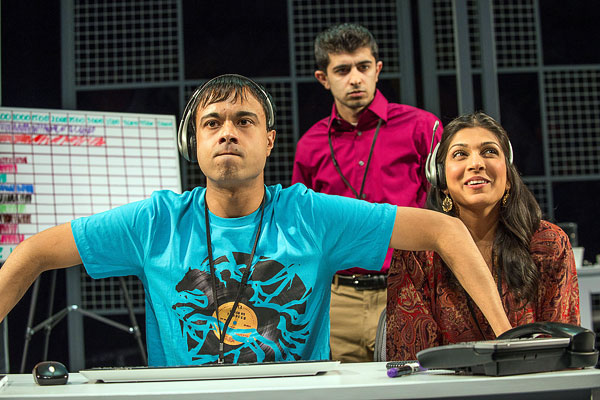
What we have here is a failure to communicate. Or, to put it in linguistically obvious terms: Victory Gardens’ staging of Disconnect fails to connect. Never mind that Anupama Chandrasekhar’s drama, centered around a credit card call center in India, aims to probe the ways in which the links of common humanity between people can be fractured and twisted to the point where even basic communication becomes impossible. Any ideas that Chandrasekhar might have had in exploring that inherently dramatic issue become hopelessly lost amid dialogue that never rings true and situations that are equally unbelievable. (A call center worker falls in love with a disembodied voice thousands of miles away? Really?)
The setting here is the Illinois floor of True Blue, a call Center in Chennai, India, where ambitious twenty-something workers attempt to collect delinquent credit card balances from in-debt residents of the Land of Lincoln. There’s a leaderboard (half-baked shades of a far superior drama, Glengarry Glen Ross) that puts the Indians in competition with each other as they put on U.S. accents try and squeeze money out of their overseas “marks.” Set designer Grant Sabin’s appropriately sterile landscape of cubicles and phone lines presents the potential for an intriguing exploration of culture clash, generation gaps, economic ironies and the encroaching influence of the materialistic west on communities an ocean and more distant.
That potential is never realized. The primary problem with Disconnect is one that director Ann Filmer can’t seem to overcome, and that’s a play wherein huge chunks of the dialogue aren’t heard. Shut out from everything the U.S. debtors reply to their Indian callers, the audience spends much of the piece listening to half conversations. Surely there’s a way to make one-sided phone conversations as rich and complete as those wherein one can hear both ends of the talking. But Chandrasekhar doesn’t find it.
It seems clear that Chandrasekhar aimed to explore the complexities of a workplace wherein the workers must suppress their real identities in order to do their jobs effectively. The young, educated Indians of True Blue do their best to speak like their U.S. targets, adopting U.S. idioms and colloquialisms in order to gain trust, sound relatable and, in the end, squeeze money out of their Heartland debtors. When you consider the comparative wealth of the U.S. compared to much of India, you realize there are rich economic ironies to be plumbed in a story of those comparatively rich Americans who can’t manage to pay their debts. Such issues of economics and identity provide the seeds for a provocative drama. But they lie dormant in Disconnect, provocative ideas that Chandrasekhar fails to present with any degree of authenticity.
Photograph: Michael Brosilow/Victory Gardens Theatre


